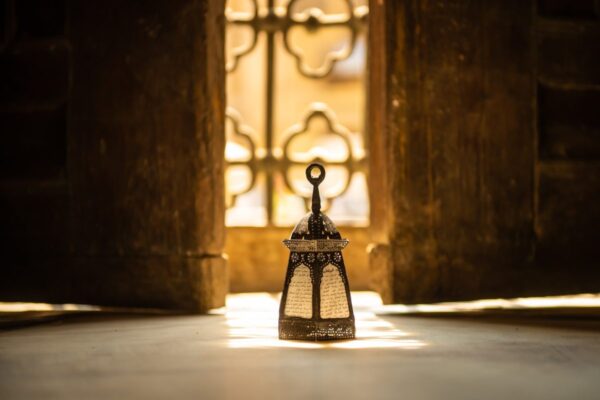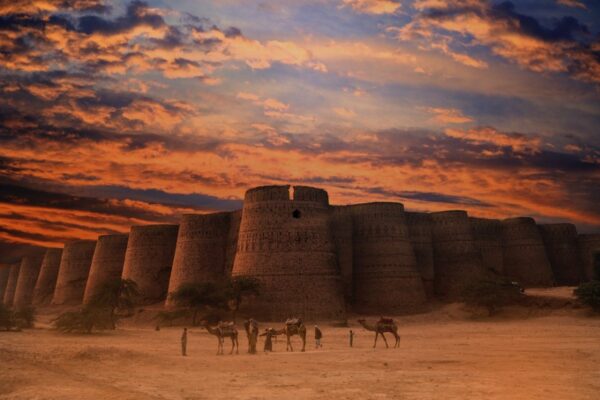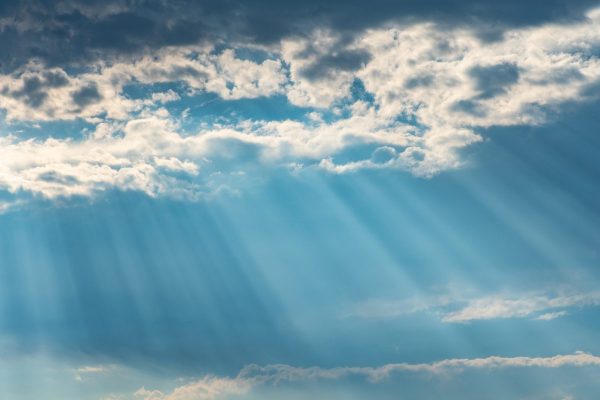Background
The next Prophet to appear in the Qur’an is Hud [peace be upon him]. He is the son of Shalikh/Shalukh, the son of Arfakhshadh, the son of Sam, the son of Noah. And according to another tradition, the son of Abir, the son of Shalikh/Shaluk, the son of Arfakhshadh, the son of Sam, the son of Noah. And according to another tradition, the son of Abdullah, the son of Rabah, the son of Jarud, the son of Aad, the son of Gawas, the son of Iram, the son of Sam, the son of Noah.
The people of ‘Aad
It is said that Arabic was spoken in the time of Hud [peace be upon him]. He was sent to the people of Aad, who lived in Yemen. This people first lived in tents and then they made big holes in the mountains to live in them. This people also started worshiping various idols, such as Samad, Thamood and Hirr. This was the reason for Hud [peace be upon him] to be sent. In the Qur’an, Hud [peace be upon him] is described as a brother to his people. The people of ‘Aad were a people who oppressed the weak and were very proud.
The people of ‘Ad did not receive rain for a long time and then they sent about seventy people to the Ka’ba to pray for rain. Once in the Hijaaz they came to Muawiya ibn Bakr, a wealthy man who received them as guests. The group started to enjoy all the food and drink and partyed for about a month until Muawiya become tired of them. Then they went to the Ka’bah to supplicate for rain and saw three clouds coming towards them from afar. The three clouds were all different, one was white, the other red and the third was black. They were allowed to choose one of the three clouds and chose the black cloud, because they thought it contained rain. In this cloud however, sat the punishment for the people of ‘Aad.
The punishment
The chosen cloud contained sand and stones and with it the people of ‘Aad were destroyed. There was a small group of the people of ‘Aad, called Banu Lawniya, who lived in Makkah and were not guilty of idolatry. This group was not affected.
Allah says about this punishment: “When they saw it rising like a thick cloud approaching their valleys, they said: “It is a rising cloud that brings us rain.” “Nay, it is that which ye would hasten, a wind in which is a painful torment, which destroyeth all by the command of its Lord.” In the morning only their houses were seen. Thus do We repay the criminals. We had given them such power as We have not given you. And we had given them hearing, sight, and hearts, but their hearing, their sight, and their hearts profited them nothing when they denied God’s signs, and they were encompassed by that which they mocked.1
And: “[The people of] ‘Ad also denied [the warners and the warnings] and how [severe] was My punishment and My warning! We have sent upon them a raging tempest, on a Day of perpetual calamity, which swept away the people as if they were uprooted palm stumps.”2
And: “And as for the ‘Ad, they have been destroyed by a raging, destructive wind. He has released it [the wind] upon them unceasingly for seven nights and eight days. You saw the people lying there, felled, as if they were hollow palm stumps.”
The Prophet (sal Allahu alayhi wa sallam) said about this tornado that its size was no larger than a ring, indicating a very powerful tornado. Therefore, the Prophet (sal Allahu alayhi wa sallam) made the following supplication when there was wind: “O Allah, I ask You for good from this wind and I seek refuge with You from its evil.”4
So the people of ‘Aad were destroyed with a tornado and there was none left except those who believed in Hud. The others did not want to change their parents’ religion for the truth.
1 Surat al-Ahqaf, verses 24-26
2 Surat al Qamar, verses 18-20
3 Surat al-Haqqa, verses 6-7
4 Abu Dawud and Ibn Majah






